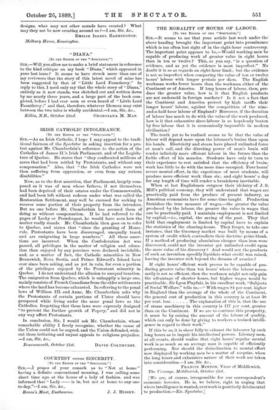IRISH CATHOLIC INTOLERANCE.
[TO THE EDITOR OF THE "SPECTATOR."] SIR,—As an Irish Catholic, I hope I may appeal to the tradi- tional fairness of the Spectator in asking insertion for a pro- test against Mr. Chamberlain's reference to the action of the Catholics of James It's Irish Parliament, and of the Legisla- ture of Quebec. He states that " they confiscated millions of acres that had been settled by Protestants, and without any compensation." Also, that " the Irish Catholics were not then suffering from oppression, or even from any serious disabilities."
Now, as to the first assertion, that Parliament, largely com- posed as it was of men whose fathers, if not themselves, had been deprived of their estates under the Commonwealth, and had been left without redress under what was called the Restoration Settlement, may well be excused for seeking to recover some portion of their property from the intruders. But no one before Mr. Chamberlain has accused them of -doing so without compensation. If he had referred to the pages of Lecky or Prendergast, he would have seen how the matter really stands. Mr. Chamberlain then goes on to refer to Quebec, and states that " since the granting of Home- rule, Protestants have been discouraged, unequally taxed, and are emigrating in large numbers." All these asser- tions are incorrect. When the Confederation Act was passed, all privileges in the matter of religion and educa- tion then enjoyed by any province were declared inviolable, and, as a matter of fact, the Catholic minorities in New Brunswick, Nova Scotia, and Prince Edward's Island have ever since been asking, and as yet in vain, for even a portion of the privileges enjoyed by the Protestant minority in Quebec. I do not understand the allusion to unequal taxation. The emigration from Quebec, which is unhappily a large one, mainly consists of French Canadians from the older settlements where the land has become exhausted. In referring to the penal laws of William III. and Anne, Mr. Chamberlain asks why the Protestants of certain portions of Ulster should have prospered while living under the same penal laws as the Catholics, forgetting that these laws were expressly designed "to prevent the further growth of Popery," and did not in any way affect Protestants.
In conclusion, Sir, I would ask Mr. Chamberlain, whose remarkable ability I freely recognise, whether the cause of the Union could not be argued, and the Union defended, with- -out these irritating and unjust appeals to religious prejudice. —I am, Sir, &c.,






































 Previous page
Previous page